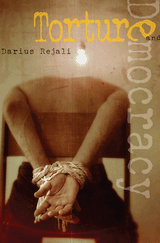 | Torture and Democracy |
This is the most comprehensive, and most comprehensively chilling, study of modern torture yet written. Darius Rejali, one of the world's leading experts on torture, takes the reader from the late nineteenth century to the aftermath of Abu Ghraib, from slavery and the electric chair to electrotorture in American inner cities, and from French and British colonial prison cells and the Spanish-American War to the fields of Vietnam, the wars of the Middle East, and the new democracies of Latin America and Europe. As Rejali traces the development and application of one torture technique after another in these settings, he reaches startling conclusions. As the twentieth century progressed, he argues, democracies not only tortured, but set the international pace for torture. Dictatorships may have tortured more, and more indiscriminately, but the United States, Britain, and France pioneered and exported techniques that have become the lingua franca of modern torture: methods that leave no marks. Under the watchful eyes of reporters and human rights activists, low-level authorities in the world's oldest democracies were the first to learn that to scar a victim was to advertise iniquity and invite scandal. Long before the CIA even existed, police and soldiers turned instead to "clean" techniques, such as torture by electricity, ice, water, noise, drugs, and stress positions. As democracy and human rights spread after World War II, so too did these methods. Rejali makes this troubling case in fluid, arresting prose and on the basis of unprecedented research--conducted in multiple languages and on several continents--begun years before most of us had ever heard of Osama bin Laden or Abu Ghraib. The author of a major study of Iranian torture, Rejali also tackles the controversial question of whether torture really works, answering the new apologists for torture point by point. A brave and disturbing book, this is the benchmark against which all future studies of modern torture will be measured. Darius Rejali is professor of political science at Reed College and an internationally recognized expert on modern torture. He is the author of Torture and Modernity: Self, Society, and State in Modern Iran. "Darius Rejali has written a superb genealogy of modern torture. Meticulously researched and filled with surprising insights, Rejali's indictment derives its power from thoughtful analysis and deep historical grounding. It is the best book on the subject that I have encountered. No one should debate the merits of torture without having read it."--Kenneth Roth, executive director of Human Rights Watch "Darius Rejali has given the world an extraordinary work of scholarship and personal passion that no one wants to hear about but that everyone must learn about. Torture and Democracy exposes the core issues facing every nation whose deepest values of human dignity are defiled by its state-sanctioned 'violence workers.' Beyond platitudes, this pioneering expert descends into the torture dungeons around the world to reveal the strategies and tactics secretly used to break human will to resist. A vital book for anyone wanting to understand the whys and hows of torture being practiced today by our own government."--Philip Zimbardo, author of The Lucifer Effect: Understanding How Good People Turn Evil "Monumental. Definitive. Devastating."--Sidney Blumenthal "Torture and Democracy brings the fact of torture straight home to democratic societies--societies that are the most reluctant to acknowledge the presence of torture in their midst. Darius Rejali's theme is the appeal of stealth forms of torture in democracies, but he also illuminates the culture of disinformation, self-deluding euphemisms, and outright mythology that accompanies these kinds of torture. Rejali's research has been truly formidable. He has read more widely in more disciplines than any analyst of torture that I know of."--Edward Peters, author of Torture Subject Areas: |














No comments:
Post a Comment